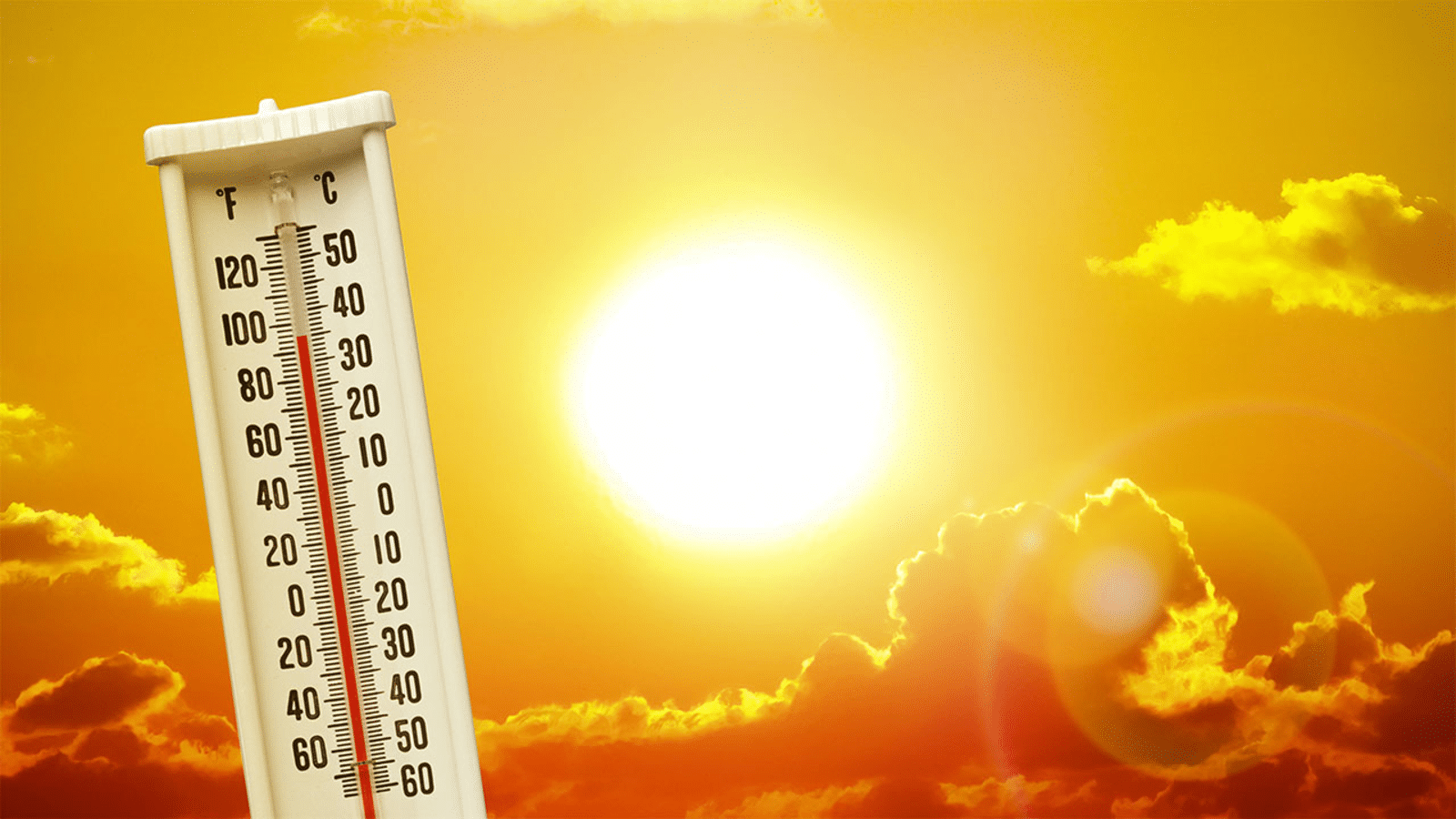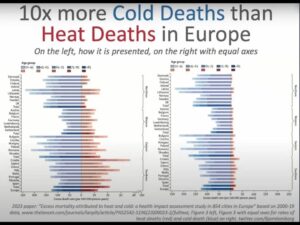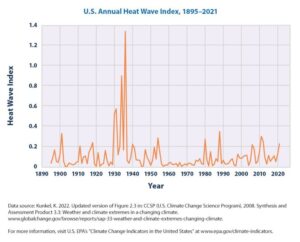
By Raul Zavaleta
With this year’s hot summer weather, the alarmism of “Climate Changers” has been hot as well. Here are three quotes:
Michael Mann, Environmentalist at Penn State University speaking in July:
Now the warming has reached the point where we’re seeing the consequences play out in real time in devastating events. We’ve got to bring carbon emissions down by 50% within the next 10 years to prevent the planet from warming beyond a truly catastrophic amount.
President Biden again in July:
Right now a hundred million Americans are under heat alert, 100 million Americans. It’s astounding the damage that’s being done.
John Kerry, who now has the unwieldy title of Special Presidential Envoy for Climate:
You all saw the most recent IPCC (Intergovernmental Panel on Climate Change, a UN body.) In one scientist’s words, ‘our house is already on fire’. Too many around the world are pursuing the path of least resistance. All evidence shows that this is the path of greatest destruction.
When asked to comment on the rhetoric of politicians pushing for extreme solutions, Bjorn Lomborg, the author of the book “The Skeptical Environmentalist”, said this:
Well, I think you’ve pretty much laid out the basic problem of the climate challenge. That it is a real problem, but then it’s being sensationalized beyond all belief. And very often we then try to push really poor policies that actually end up increasing some of the other problems that we also need to tackle.
There is evidence that the Earth is slowly warming. On the other hand, we should have a sense of proportion. Will future warming make the world unliveable hot? No, given two facts almost universally acknowledged by climate scientists:
- The diminishing warming impact of CO2 – The warming impact of CO2 diminishes (“logarithmically”) as it increases in concentration. Every new molecule of CO2 we add to the atmosphere has less of a warming effect than the previous one. Warming will diminish as emissions increase — the only question is at what rate. (Equilibrium climate sensitivity is defined as a warming in °C per doubling of greenhouse-gas concentrations in the atmosphere. The IPCC – the Intergovernmental Panel on Climate Change — estimates it to be between 2.5°C and 4°C. Another analysis suggests it to be below 2°C.)
- The concentration of warming is concentrated in colder places.
One of the tactics in this deception is “treating local extremes as global” happenings. Given the slow pace of global warming, local temp changes tend to be much larger than global ones. To scare us, catastrophists take the hottest local temps and portray them as global so we think everywhere is very hot.
An example of treating local extremes as global has been the national media’s focus on Texas when Texas has been “abnormally” hot while ignoring the many places that have been “abnormally” cool.
You have heard claims of the “hottest year on record.” Is it true? Yes, but to add perspective it only contains the last 200 years and falls apart when including temperatures of earlier years. But the motive is to scare you into thinking that we will all die if we do not accept the political solution
Lomborg responded to the summer heat question this way:
What we are seeing, absolutely. And this is also what we’d expect. As temperatures rise you’re going to see more heat waves and that will be a problem. My contention with this issue has never been is climate change real? Absolutely, it’s real, it’s manmade. It is something that we should be concerned about. I want us to get a sense of proportion. That is of all the issues that we are facing, how big of a problem is climate change? And then of course, the second part is, are we making good policy to actually address this? And I think the heat waves are a great way to start this conversation. So look, many places have had unusually high heat waves, and that’s what we would expect from global warming. But we need to get the information, not just when they fit with climate change, but also when they don’t fit with the narrative. So most people don’t know that almost everywhere on the planet many more people die from cold than from heat.

For some true perspective on heat waves, look at the U.S. Annual Heat Wave Index from the EPA, which says “longer-term records show that heat waves in the 1930s remain the most severe in recorded U.S. history.” Today’s “reporting” would give you no indication that this is the case:

One of the things climate alarmists do is to only look at the negatives, not the benefits. Opponents of fossil fuels also commit this fallacy by ignoring the temperature-mastery benefits of fossil fuels. Demonizing fossil fuels is foolish. As I have argued previously, we need a serious plan to transition from fossil fuels, but we need fossil fuels in that transition. Fossil fuels are the only source of low-cost, reliable energy that, for the foreseeable future, can provide energy to billions.
The only moral and practical way to reduce the use of fossil fuels is innovation that makes low-carbon energy globally cost-competitive. To do it humanely and practically means focusing on liberating alternatives — especially the most potent, nuclear — to try to truly outcompete fossil fuels in the future. Depriving us off fossil fuels now and pretending China will follow suit is immoral and impractical.
Instead, what we get is the use of political science to try to scare people into relinquishing control of their lives to the “elite” climate advocates. What would they do with that control? Mandate where we can go and when? Determine how much food, clothing, and shelter we should have? Will this happen to “the rest of us” while the “elites” in charge of our lives have whatever they want as a reward for saving us from ourselves?
When listening to this news just remember that climate activists are using fear to implement their means, not to protect you.
ABOUT THE AUTHOR
Raul was born to a Catholic family in the Central American country of El Salvador. He attended a private Catholic school run where he received a great education and a solid foundation of Catholic values and morals.
During his high school years, Cuba began exporting communism to Central America. Raul recalled many discussions comparing the economic models of communism and capitalism in his classes. He remembers defending the freedom of Capitalism over the authoritarianism of Communism, but often found himself in the minority.
Funded by the Soviet Union, through Cuba, leftist organizations hired poor peasants to protest and bring chaos to the cities in El Salvador, attempting to bring a nationwide response to the “unfairness of capitalism” and promote seizure of property that could be transferred to the laborers.
In 1973, Raul’s entire family left El Salvador to escape the coming 12-year war and to seek the opportunities the Unites States promised.
In the United States, Raul Zavaleta attended the University of California at Los Angeles (UCLA) and received a Bachelor of Science degree in Chemical Engineering.
He has spent his business career in leading executive positions in the intersection of Life Science and Information Technology with an emphasis on diagnostic testing and pharmaceutical research. He is currently a Partner at Cogent Scientific.
He moved to Indianapolis in 1985 to open the first of several successful business ventures. Over the years, Mr. Zavaleta has mentored emerging companies sharing his international entrepreneurial experience to help them achieve their success goals.
He volunteers his time to the community by serving on the Board of Trustees of Marian University and serving or having served on the Board of Directors of United Way of Central Indiana, Central Indiana Community Foundation, Indianapolis Arts Council, Indiana Health Industry Forum, Indiana Sports Corp, Indy Eleven Soccer Foundation, The Neighborhood Charter Network, and the Greater Indianapolis Chamber of Commerce. He also served many years as Assistant Varsity Soccer Coach at Guerin Catholic High School.
Since 1989, he has been a parishioner at Our Lady of Mount Carmel in Carmel, Indiana, where he served in many volunteer capacities in the Parish Council.
